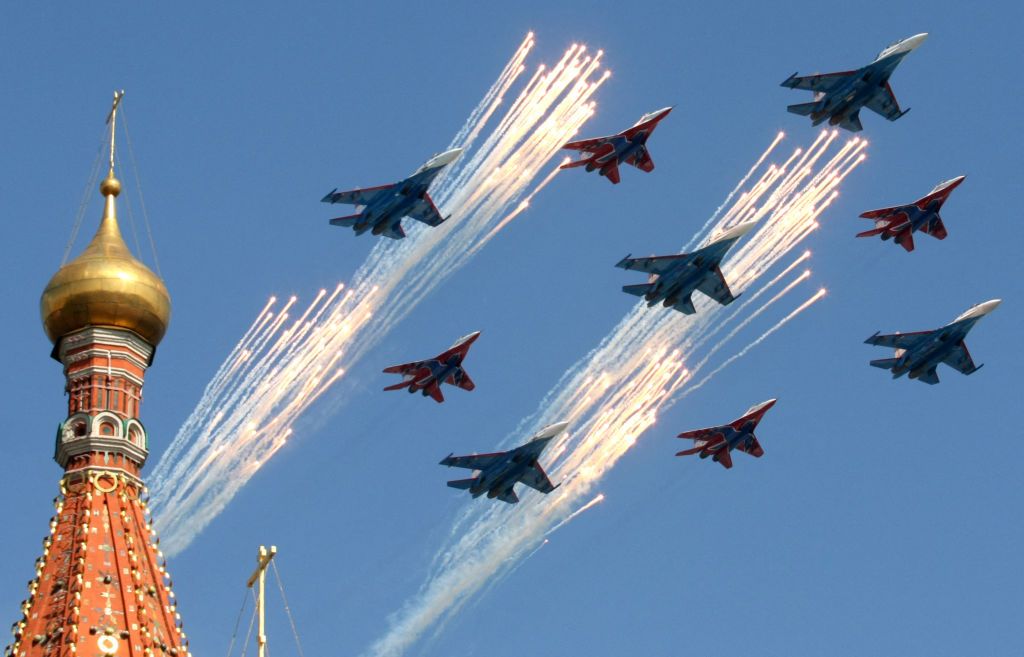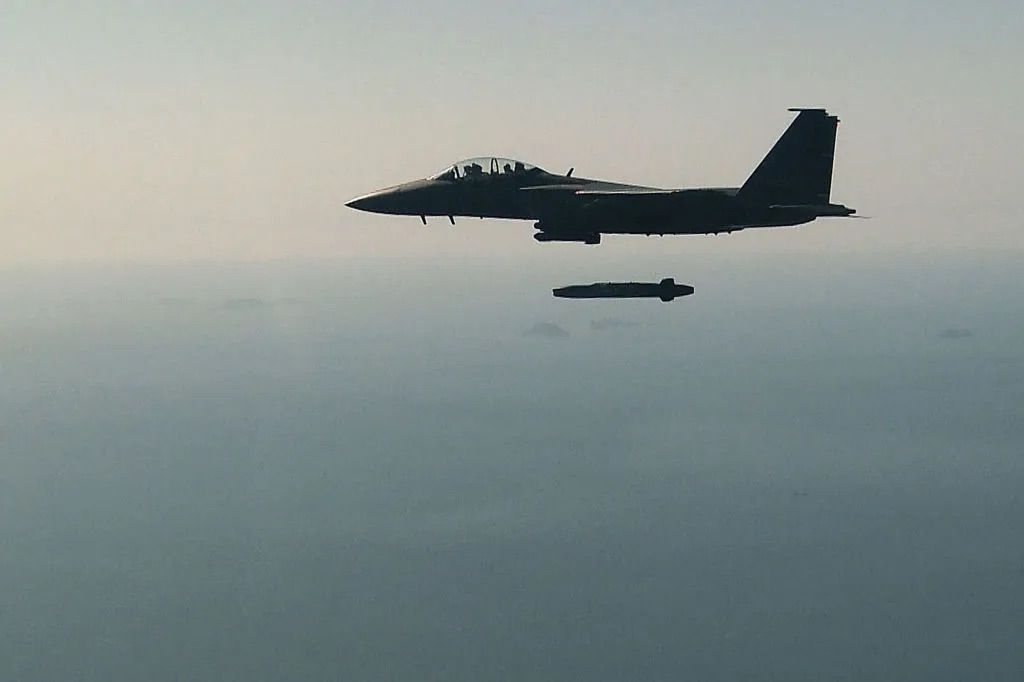Taurus missiles: Why Ukraine wants them – and Germany hesitates

A Taurus cruise missile is displayed in a production facility of MBDA Deutschland on March 5, 2024 in Schrobenhausen, Germany. MBDA produces a variety of air and marine missile systems for military use, including the Taurus. (Leonhard Simon/Getty Images)
When faced with questions from German lawmakers on March 13, Chancellor Olaf Scholz once again said "no" to the delivery of the Taurus long-range missile to Ukraine.
"Prudence is not something that one can qualify as a weakness. Prudence is something that the citizens of our country are entitled to," he said.
The next day, the Bundestag, the German parliament's lower chamber, voted against a motion to send Taurus missiles to Kyiv for the third time in 2024.
Ukraine officially asked Berlin to provide one of the most powerful long-range missiles at the end of May 2023 but heard uncertainty in response and, later — consistent refusals.

Almost a year later, Kyiv faces a critical shortage of ammunition, which has already contributed to the fall of the key front-line city of Avdiivka in Donetsk Oblast and can result in more losses.
What is behind Ukraine's obsession with receiving the Taurus missiles, and why is Germany constantly refusing to provide Kyiv with this specific weapon?
Advanced capabilities
Taurus is a joint German-Swedish-made cruise missile that can travel up to over 500 kilometers, outmatching the capabilities of other Western long-range systems that Ukraine has in service.
The British Storm Shadow missiles, along with the French equivalent, the SCALP missiles, have a range of up to 250 kilometers, while the Army Tactical Missile Systems (ATACMS) so far delivered to Ukraine by the U.S. — can fly roughly 160 kilometers.
With this advantage, Taurus would help Ukraine hit more targets in the occupied territories and, in theory, could also reach deep into Russia. Once launched, the long-range missile flies at an altitude of 35 meters, which makes it difficult for radars to detect and helps bypass defense systems.
Taurus missiles were designed to hit buried and protected targets, including command posts and bridges. Potentially, the Kerch Bridge, which is a critical supply and transport route for Russian forces to occupied Crimea and other occupied territories, could become one of them.
The 19-kilometer bridge has already been successfully attacked by Ukraine-made experimental Sea Baby naval drones.

"Taurus is the best weapon system in Western arsenals to take down bridges. So in theory, if Ukraine wants to take down the Kerch Bridge, Taurus would be the ideal weapon system to do that," Fabian Hoffmann, doctoral research fellow at the University of Oslo, who specializes in missile technology, told the Kyiv Independent.
Equipped with a sophisticated warhead, Taurus can be programmed to explode after hitting a specific target, such as a bunker. The missile can penetrate several layers before the final explosion, causing maximum damage.
Germany reportedly has around 600 Taurus long-range missiles, 150 of which are ready for deployment.
The list of Western planes from which German missiles are fired does not include the aircraft that Ukraine has. Taurus "can be easily adapted" to F-16 fighter jets, which are soon to be deployed in Ukraine, and to Gripen — a Swedish aircraft that was considered for transfer and was successfully tested by Ukrainian pilots, according to MBDA, the company which developed the missiles.
Experts believe that the Taurus is unlikely to be a game-changer in the war and that Ukraine needs it primarily to replenish its long-range weapons stockpile.
"Storm Shadow, SCALP EG, they are running out sooner or later. Taurus is another very capable cruise missile that could be used by Ukrainians to just extend the availability of its long-range range strike capability. This is a key advantage. It's mostly about the quantity and the number of missile systems available in Ukraine's arsenal," Hoffmann said.
U.K. Foreign Secretary David Cameron proposed the idea of a so-called ring exchange, which means that London supplies Ukraine with additional Storm Shadow missiles in exchange for Germany backfilling British long-range missile stocks.
While German Foreign Minister Annalena Baerbock said the swap would be an option, Scholz rejected the idea.
Scholz's fear
Before Russia's full-scale invasion, Berlin consistently refused to provide Kyiv with weapons.
Soon after the full-scale invasion, however, Germany became the second biggest military donor to Ukraine, only behind the U.S.
Kiel Institute for the World Economy calculated that Germany's defense assistance amounted to as much as 17.7 billion euros ($19 billion).

Despite that, the supply of heavier armor, such as Leopard battle tanks and Marder infantry fighting vehicles, has always been met with long delays and talks of "escalation."
Chancellor Olaf Scholz appears to be the main obstacle to this. Despite the assurances of trust in Ukraine, Scholz's statements seem to read the opposite.
In the recent one, the chancellor said that Taurus could reach Moscow in case of "misuse."
Earlier, Scholz allegedly wanted to modify the missiles in such a way as to make it impossible for them to strike at Russian territory, Der Spiegel reported, which Ukrainian Ambassador to Berlin Oleksii Makeyev compared to "a ban on crossing the opponents half of the field."
Kyiv has repeatedly promised it would not attack Russian territory with long-range weapons provided by Western allies.

"We need Taurus to destroy the Russian military infrastructure behind the front line on Ukrainian territory," Foreign Minister Dmytro Kuleba said.
"A nightmare scenario for Scholz is that Ukraine would use Taurus to strike politically sensitive targets inside Russia. Scholz fears that this could escalate the war and throw Germany into direct hostilities with Russia," Hoffmann said.
"Fundamentally, this means that Scholz is restrained by a lack of political will, which stems from a lack of trust in Ukrainian leadership to not break any promises."
President Volodymyr Zelensky voiced optimism that Scholz could transfer the long-range missiles to Ukraine if his American counterpart, Joe Biden, decided to deliver the longer-range ATACMS, which was already present on the battlefield in small quantities.
"This weapon (Taurus) is very important for us. I'll say this: The United States and then Germany. And it is always like this," Zelensky said at a press conference on Feb. 25.
Prior, Berlin followed Washington's lead in handing over the first Patriot air defense system in early 2023.


“I think, it’s mainly German debate, and we have maybe the final point of what the chancellor said. I’m not sure about that at the moment," Thomas Wiegold, German journalist and defense expert, told DW.
Hoffmann estimates Ukraine's current chances of getting a Taurus as "very small."
Experts believe that the issue can get off the ground with political changes in Germany, which is unlikely in the near future.
Taurus leaks
On March 1, a recording of an alleged conversation between 4 German officers, published by Russian propagandist Margarita Simonyan, chief editor of the Kremlin-controlled TV channel RT, sparked a scandal in Germany.
They discussed the hypothetical delivery of Taurus long-range missiles, the potential strike on the Kerch Bridge, and the training of Ukrainian troops.
Berlin confirmed the sensitive talks were real but couldn't say whether the 38-minute audio had been edited. The investigation has been launched.
"It is a hybrid disinformation attack. It is about division. It is about undermining our unity. We mustn't fall for Putin," German Defense Minister Boris Pistorius said, insisting that the incident was a one-off.

In fact, the recording exposed gaps in the security of communication within the German military but also debunked the so-called technical barriers, which were among Berlin's arguments not to send Taurus to Ukraine.
Among the reasons Scholz gave for not providing Ukraine with long-range missiles was the alleged inability to use them without the German soldiers' involvement. However, Spain and South Korea, which have Taurus in stock, have been successfully trained to operate the missiles without Berlin's constant oversight.
"The high-ranking German officials pointed out in the call several pathways to how you can make sure Ukrainians can effectively use Taurus with or without German involvement," Hoffmann said.
“If U.S possibly might decide to deliver those missiles (ATACMS), maybe the German point of view might change as well… On the other hand, if you want to be in lockstep with the allies, why not be in lockstep with the U.K. and France? That question remains open,” Wiegold added.














